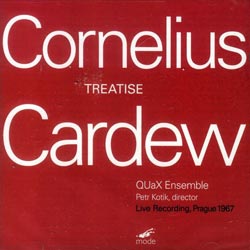
Cardew wrote 'Treatise', a 193 page graphic score containing extraordinarily beautiful, calligraphic-style images but no performance instructions whatsoever, between 1963 and 1967. There were performances of selected portions from 1964 on by members of England's avant-classical community as well as musicians from AMM (of which Cardew was a member) and others. Its profoundly open-ended but structurally subtle nature proved to be fertile ground for a vast number of approaches. Very early on, for instance, John White was reading the notation in a "perverse" manner (i.e., interpreting a rising line as a downward musical arc, a square shape as relating to a circular object, etc.).
The disc at hand presents one of the first attempts at a performance of 'Treatise' in its entirety and therein lays the central problem. The QUaX Ensemble was a quintet under the direction of Petr Kotik and they undertook this adventure in Prague in 1967. The essential instrumentation, though each musician played a multitude of items, was Kotik on flute, Pavel Kondelík on tenor saxophone, Jan Hynčica on trombone, Josef Vejvoda on percussion and Václav Zahradnik on piano. Several seem to have had experience in jazz, notably the tenor player; the inflections are readily apparent throughout. The total playing time of the 2-disc set is 127 minutes, making it a certifiably lengthy affair until you do the division and realize we're talking about an average of 40 or so seconds per page.
True, as noted above, there are no rules. Aside from the presumed implication of the two empty staves that run along the bottom of each page, there's not even an indication that it need be read in a musical manner at all. Its pages range from entirely blank (p. 141) to extravagantly baroque (p. 183, for example), gorgeously drawn and, often, highly evocative. To many people, including this writer, the idea that one could essentially "skim" through it seems to totally miss the point. One can imagine doing so as a kind of exercise; Fred Frith has had students race through at 30 seconds per page in, if you will, a "Naked City" rendition. But to approach 'Treatise' seriously (if, indeed, such is one's desire), would seem to require some amount of time spent dealing with not only each page, but that page's relationship to all the others, to the overall structure of the work, even to its relationship to corresponding parts of the Wittgenstein work to which its title refers. A performance of all 193 pages should, one might guess, take upwards of a day.
That being said, one has the choice of approaching this particular recording either with 'Treatise' in mind, in which case its main value is simply as a historical document; a valuable one, to be sure, but not a particularly compelling interpretation. Or, one can simply listen to it as a controlled improvisation, where it succeeds to a somewhat greater degree. Especially for its time, compared to quasi-similar music (regardless of source or inspiration) being created, say, by Roscoe Mitchell or the Spontaneous Music Ensemble, it's right near the vanguard of sound-production and free improvisation. There's a jazz element, certainly, one you wouldn't hear in AMM, as well as unison lines that would seem unlikely to crop up in a truly improvised performance, but also plenty of silence and "noise", including some radio captures. At times, the music flows nicely, the contributions both imaginative and well considered. The appearance of a (presumed) Czech folk song, humorously sung with piano accompaniment, shows that the musicians were more than willing to stretch boundaries beyond academic seriousness. Often, however, there's a sense of awkwardness, of discontinuity, something that could well be part and parcel of the score's interpretation, so it's difficult if not impossible, at least without further detailed input from the participants (unfortunately lacking in this release), to make value judgments if that's the case; one can only say, "I enjoyed it" or not. Overall, this listener found it more "interesting" than profound or deeply felt. Cardew fans will want to hear it as a reading of "Treatise" early on in its lifespan but they may not find themselves returning here very often to glean additional insight.
Comments and Feedback:



More Recent Reviews, Articles, and Interviews @ The Squid's Ear...


|

